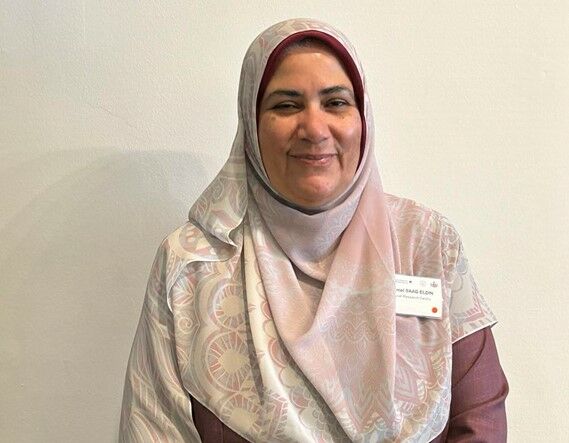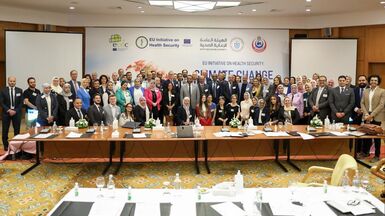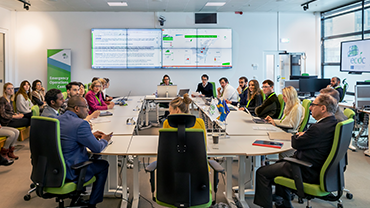Understanding the intersection of climate change and infectious diseases: an interview with Amal Saad-Hussein
In this interview, Professor Amal Saad-Hussein, a seasoned Egyptian researcher in environmental and occupational medicine, explores the critical intersection of climate change and infectious diseases, emphasising the importance of accurate data, international collaboration, and resilient health systems.

We talked to Professor Saad-Hussein during the three-day workshop on climate change and infectious diseases, organised under the EU Iniative on Health Security, on 21−23 May 2024 in Sharm El-Sheikh, Egypt.
What motivated you to focus your research on the intersection of climate change and infectious diseases?
As a medical professional, I wanted to understand climate change and its impact on health. I began this journey in 2005, under the mentorship of a prominent professor in my field. He discussed with me how climate change would start affecting health, which sparked my interest in researching the link between climate change and the spread of infectious and non-communicable diseases. I realised it was not just a local issue, but a global problem. This was a crucial topic for a researcher because new developments and challenges were arising on a daily basis. My background in preventive medicine also inspired me to explore how people can protect themselves from climate-related health threats.
Can you provide a specific example of an infectious disease that has been directly influenced by climate change?
I am a researcher in environmental and occupational medicine. Many of the health problems in occupational settings are not linked to climate change, but to workplace exposure. One of my studies focused on the ceramics industry. Workers there suffered from respiratory issues, which we initially thought were due to inhaling dust. However, when we cultured their sputum, we found fungi. After studying the workplace environment, I discovered that climate change had altered temperature and humidity levels, increasing fungal growth. Treating the workers with antifungal medication led to significant improvements. This was one of the first studies to link climate change, environmental exposure, and occupational health, for which I received an award.
Have you found that some regions or populations are more vulnerable to the impact of climate change on health than others?
Yes, Africa is particularly vulnerable due to its geographic location and socio-economic factors. Many African countries have limited access to healthcare, especially in remote areas, and lower levels of education. These factors make it harder for people to protect themselves from the impact of climate change. In addition, Africa's climate is highly sensitive to temperature change, which exacerbates health challenges.
How does access to accurate scientific data influence the study of climate change and disease patterns?
Availability of accurate data is crucial for researchers to study the link between climate change and disease patterns. Without proper data, our projections and strategies may be flawed. Accurate data allows us to predict future disease outbreaks and implement effective protection strategies. For instance, in 2015 Egypt experienced extreme temperatures that led to many cases of heatstroke. If there had been a link between the meteorological authorities and the Ministry of Health, we could have been better prepared and we could have saved lives. Accurate data helps in planning and allocating resources effectively to mitigate the impact of climate change on health.
What role do international collaborations play in adaptation efforts?
International collaboration is essential because climate change is a global problem. Working together allows us to develop comprehensive strategies for mitigation and adaptation. For example, if there is an outbreak in a neighbouring country, such as Sudan, collaboration can help manage the health impact on Egypt. Sharing knowledge and strategies among countries makes us all safer and more prepared. Conferences like this, organised under the EU Initiative on Health Security, are valuable as they facilitate knowledge exchange and networking, helping us learn from each other and work together effectively.
What do you see as the most significant gaps in current research regarding health vulnerability and adaptation to climate change?
One of the biggest gaps is the lack of accurate statistics. This is not just a problem in Egypt but also in many other countries. Without reliable data, it is challenging to make accurate projections and develop effective strategies. Researchers need access to data to identify the real problems and find solutions. Improving data collection and making it accessible to researchers would significantly enhance our ability to address impacts on health that are related to climate change.
Lastly, what is your vision for the future in terms of addressing the health impacts of climate change?
My vision is a global network where knowledge and data are shared freely among countries. Large-scale projects covering entire regions would help us prioritise and tackle the most pressing issues. By working together, sharing knowledge, and pooling resources, we can create climate-resilient health systems. I hope that the future will bring more international collaboration, comprehensive strategies, and effective solutions to mitigate the health impacts of climate change.







